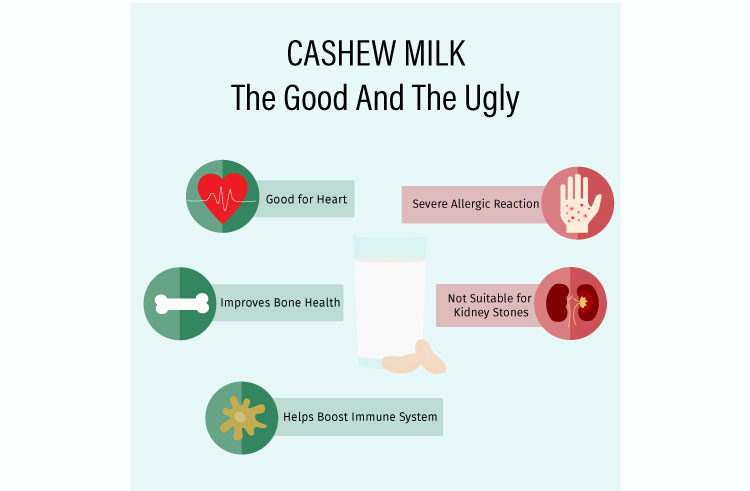Nutrition
Per 100 ml of plain, natural, unfortified cashew milk
Energy 34 kcal
Fat - 2.9 g.
Proteins - 1.1 g.
Carbohydrate - 1.1 g.
Sugars- 0.3 g.
Fiber - 0.3 g.
Vitamins - Vitamin K 2%
Minerals - Copper 13%, Magnesium 4%, Zinc 3%
Benefits
Good for Heart
Cashews is one of the miracle food for heart health as it is believed to lower risks associating with heart disease including high cholesterol, obesity and high blood pressure. Studies also proven that the consumption of cashews with high fat content can help lower LDL cholesterol and may prevent plaque within artery wall due to the phytosterol compounds found in cashews.
Improves Bone Health
Although cashew milk is low in calcium, but it contains other minerals that are important parts of healthy bone. The minerals found in cashew milk are magnesium copper and vitamin K which is proven to decrease risk of osteoporosis. Magnesium is essential parts of bone formation and assimilate calcium into the bone. Copper is involved in many physiological processes including maintenance of collagen and elastin which makes up connective tissues for the bone.
Helps Boost Immune System
Cashew milk contains high amount of zinc compares to others. Zinc plays viral part in straightening immune system and wounds recuperating process. Zinc also activates many types of protein in in the body especially the protein the helps with the cells growth. Cashew milk is also the excellent source of zinc suggested especially during pregnancy and in the development stages. Moderate amount of cashew nuts during pregnancy can improve the child’s memory and development.
Side Effects
Severe Allergic Reaction
Cashew nut is classified as one of the tree nuts category and contain other allergen substances which can cause overreaction of immune immune system and physical symptoms such as asthma and icy skin. Cashew nuts hypersensitivities have increased every year among children and some adults. Studies also found cashew nut cause more severe clinical reactions then peanut allergy.
Not Suitable For Kidney Stones
People with kidney stones condition should avoid consumption of cashew nut, cashew product and some types of nut as they contain soluble [oxalates](Nutritional aspect of nephrolithiasis) in the intestine interfering calcium absorption and bind with calcium in kidneys. This creates calcium oxalate stones which is the most common type of kidney stones.
Final Thoughts
Cashew milk can be a very good dairy alternative as it contains many minerals that contribute to a healthy bone and strong immune system, it also contains healthy fats that may not find in dairy. At the same time, cashew nut is one of the most allergen nuts and can create the most severe allergic reactions, even more than with peanut. People with kidney stones also need to avoid cashew milk as it can symptoms worse. Another disadvantage I found with cashew milk is that it is quite hard to find in my area and cashew nuts are not that easy to find.

